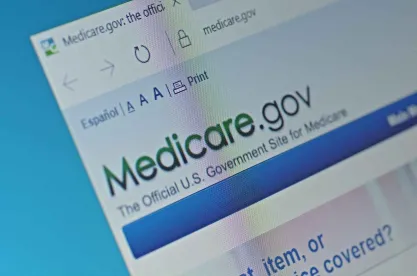On August 19, 2022, the Department of Health and Human Services Office of Inspector General (“OIG”) posted Advisory Opinion 22-16 (“AO 22-16”) to its website, a favorable opinion concluding that the OIG would not impose sanctions in connection with a program that offered $25 gift cards to Medicare Advantage (“MA”) plan enrollees who completed an online educational program about the potential risk, benefits, and expectations related to surgery. AO 22-16 is the latest in a string of recent OIG advisory opinions addressing arrangements involving remuneration to Federal health care program beneficiaries – the ninth such advisory opinion in 2022 alone.
The company that requested this advisory opinion contracts with Medicare Advantage Organizations (“MAOs”) to offer the educational program to MA plan enrollees and charges the MAOs a per-member, per-month fee for the program. MA plan enrollees who take the educational program and complete a survey receive a $25 gift card, which may be for a big box store or online retailer that offers a wide variety of items. The company that offers the educational program sends mailings and email correspondence to MA plan enrollees about the educational program but does not advertise or market the program to individuals who are not enrollees of a MA plan that has contracted with the company. The MAOs are prohibited by their contract with the company from including information about the gift cards offered under the program in marketing materials to prospective enrollees.
The program provides customized educational information to MA plan enrollees who face possible surgery in connection with their diagnosis. The program, which consists of two modules (one for patients who may face a decision regarding surgical versus non-surgical treatment options soon or in the future, and the second for patients who have opted to undergo surgery), is “designed to enhance the patient experience, increase patient literacy about surgery, reduce the incidence of inappropriate surgeries, and mitigate complications, errors, and infections for those surgeries that do occur.” The $25 gift card is only available after completion of the first module of the program, and enrollees are not eligible for more than one $25 gift card per year. Notably, the program does not refer to, recommend, or contain any information about particular providers, practitioner, suppliers, or services and only directs patients to contact their primary care providers for additional information.
The OIG concluded that while the program did implicate the Anti-Kickback Statute (“AKS”) because the $25 gift card (which may be a cash equivalent) is remuneration that could induce MA plan enrollees to self-refer to a particular MA plan offered by the MAO that arranges for the provision of federally reimbursable items and services, the OIG would not impose sanctions against the offeror of the educational program because the program presents a sufficiently low risk of fraud and abuse under the AKS. In support of this conclusion, the OIG cited the following factors:
-
The program is unlikely to increase costs to Federal health care programs or result in inappropriate utilization and could potentially actually reduce inappropriate utilization and decrease Federal health care program costs if the program works as intended. The OIG also noted the finding of CMS’s contractor that the program, which had been funded in part by CMS through a Health Care Innovation Award, was associated with statistically significant decreases in utilization and cost measures related to surgery.
-
The program was not very likely to meaningfully influence a beneficiary’s selection of a particular MA plan because the program is not advertised and MAO plans are prohibited by contract from including information about the gift cards in marketing communications to prospective enrollees. The OIG did note that the program’s gift cards could influence beneficiaries to re-enroll with the same MAO in subsequent years, but concluded that many factors come into play with that decision and the risk of influence on the re-enrollment decision is reduced by the limited frequency and modest value of the gift cards.
-
The program is unlikely to impact competition among health care providers, practitioners, and suppliers since the educational program only describes the various types of surgical facilities available and does not refer or recommend any particular provider, practitioner, supplier or service.
Additionally, the OIG concluded that the program did not even implicate the provision in the Civil Monetary Penalty Law that prohibits inducements to beneficiaries, Section 1128A(a)(5) of the Social Security Act (the “Beneficiary Inducements CMP”). The Beneficiary Inducements CMP provides for the imposition of civil monetary penalties against any person who offers or transfers remuneration to a Medicare or State health care program beneficiary that the person knows or should know is likely to influence the beneficiary’s selection of a particular provider, practitioner, or supplier for the order or receipt of any item or service for which payment may be made, in whole or in part, by Medicare or a State health care program. In this advisory opinion, the OIG concluded that the remuneration provided to MA plan enrollees is not likely to influence an enrollee’s selection of a particular provider, practitioner, or supplier since the program does not refer to or recommend any provider, practitioner, supplier, or service. Moreover, the OIG noted that to the extent the gift cards could influence Medicare beneficiaries to re-select the particular MA plan that offered this program in future years, the Beneficiary Inducements CMP does not apply to MA plans since they are not a provider, practitioner, or supplier for purposes of the Beneficiary Inducements CMP.
While the applicability of all OIG advisory opinions is limited to the particular arrangement reviewed by the OIG and the particular requestor and may not be relied upon by others, the factors articulated by the OIG in AO 22-16 and other advisory opinions involving remuneration to beneficiaries may be useful in evaluating how the OIG might view other arrangements involving remuneration that exceeds the $15 limit used by the OIG to define items and services of nominal value under the Beneficiary Inducements CMP and that do not otherwise fit into an AKS safe harbor or Beneficiary Inducements CMP exception.




 />i
/>i


